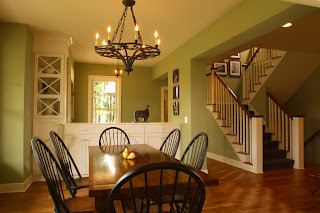Many of today's home designs incorporate open floor planning - with kitchen, dining and living areas all very open to one another. Open planning is great for entertaining and family gatherings because it allows people congretating within these "zones" to remain connected with one another.
One problem with open planning however is that sometimes the combined space becomes too large and begins to lose a sense of intimacy. Also, how about that kitchen clutter? Many clients want to remain "connected" with their guests while in the kitchen, but do not necessarily want all of that kitchen clutter exposed to their guests.
There are a number of ways to combat these issues. I will try to illustrate in the following examples designed by Larson Brenner Architects in Stillwater, MN.
Photo below illustrates dining area and adjacent front foyer. A dropped soffit in the foyer and hallway helps to define the edge of the dining space (ceiling elevation changes are a great way of defining space). Cabinetry placed between the hallway and dining serves as china cabinet and buffet counter. The position of the cabinet also reinforces the edge of the dining area. Windows on two adjacent walls help to define the center of the space, where the dining table is positioned.
One problem with open planning however is that sometimes the combined space becomes too large and begins to lose a sense of intimacy. Also, how about that kitchen clutter? Many clients want to remain "connected" with their guests while in the kitchen, but do not necessarily want all of that kitchen clutter exposed to their guests.
There are a number of ways to combat these issues. I will try to illustrate in the following examples designed by Larson Brenner Architects in Stillwater, MN.
Photo below illustrates dining area and adjacent front foyer. A dropped soffit in the foyer and hallway helps to define the edge of the dining space (ceiling elevation changes are a great way of defining space). Cabinetry placed between the hallway and dining serves as china cabinet and buffet counter. The position of the cabinet also reinforces the edge of the dining area. Windows on two adjacent walls help to define the center of the space, where the dining table is positioned.

Photo below illustrates a dining area and adjacent front entry foyer beyond. The cabinetry is now engaged between walls. This method provides a little more "enclosure" for the dining space. Double thick wall with "bulkhead" opening provides space for ductwork and creates a more dimensional separation from the adjacent kitchen and stair.

Here you can see that double thick wall opening between the dining and kitchen areas. Kitchen island has 3 surface heights. The 42" high eating bar and 48" high display cabinets conceal the primary kitchen work / clutter surfaces behind. The island itself defines the long edge of the kitchen.

In this example a kitchen is separated from the dining room with a full height cabinet. The cabinet has a "hole" in the middle to provide space for a serving counter and to maintain visibility between the spaces. Circulation flows around either side of the cabinet. The cabinet engages at the top with a bulkhead which further helps to define each of the two spaces.
.jpg)
.jpg)










No comments:
Post a Comment